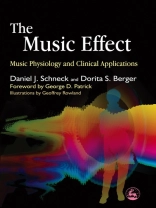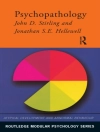Music is well known to have a significant effect on physiology and is widely used as an effective therapeutic tool in stress and pain management, rehabilitation, and behavior modification, but its effects are not well understood.
This book explains what ‘music’ is, how it is processed by and affects the body, and how it can be applied in a range of physiological and psychological conditions. Rhythm, melody, timbre, harmony, dynamics, and form, and their effects on the body are explored in detail, helping practitioners create effective therapy interventions that complement other treatment systems. Case studies and evidence from research and practice show how music therapy can benefit people with autistic spectrum disorders, Down syndrome, schizophrenia, and sensory difficulties, among other conditions.
The Music Effect is an essential resource for music therapists, clinicians, educators and anyone with an interest in holistic therapy.
Table of Content
Foreword, George D. Patrick, Mark O. Hatfield Clinical Research Center, Bethesda, MD. Preface. 1. Introduction. 2. What Is This Thing Called ‘Music’?: General Considerations. 3: Principles of Physics From Which Derive The Elements Of Music. 4: Principles Of Physiology and The Elements Of Sensory Information Processing. 5: Fear And The Instinct For Survival: What Happens When The Set-Points Go Awry? 6: Physiologic Entrainment. 7: Rhythm In Music And Physiology. 8: Melody – The Pitch Of Human Emotion. 9: Timbre, Harmony And Dynamics: Adding Richness And Depth To Rhythm And Melody. 10: Form – Creating Aesthetic Wholeness. 11: Nature Expressed Through Nurture. 12: Coda: Where Are They Now? References. Subject Index. Author Index.
About the author
Dorita S. Berger is a concert pianist, an educator and a Board Certified music therapist with over 20 years of clinical experience in sensorimotor music-based treatment for autism spectrum and neurophysiologic-related diagnoses in children and adults. She conducts workshops and lectures on the role of music in science and medicine and continues to provide consultations and music therapy services, in addition to researching the role of music in human adaptation. Dorita resides in Durham, North Carolina, USA.












